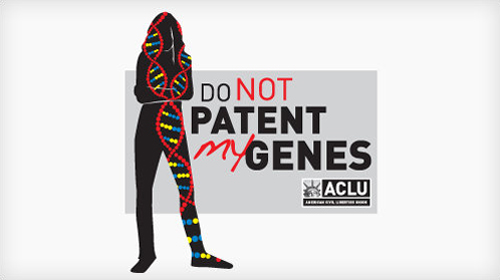
Today, we asked the U.S. Supreme Court to review an appellate court’s 2-1 ruling upholding patents on two human genes associated with hereditary breast and ovarian cancer. The case challenges patents that pose a serious barrier to using new discoveries in genetic testing and how genes influence the way cancers develop and can be treated.
BRCA1 and BRCA2 are two of the 23,000 genes in the human genome, 20 percent of which have been patented. We all have these genes, but women with certain genetic mutations are estimated to have up to an 85 percent risk for breast cancer and 50 percent risk for ovarian cancer. Myriad Genetics obtained patents on the “isolated” forms of the two genes, which simply means it obtained a patent on the human gene once it has been removed from the cell. It does not matter whether the genes come from you, me or any of the other 285 million people in the U.S., or whether you have a mutation or not – the patents claim them all. Even though laboratories around the country are fully capable of providing genetic testing for BRCA1 and BRCA2 (and were already testing patients before the patents forced them to stop), the patents in essence give a monopoly over these genes.
As a result, Myriad has the power to dictate the cost of testing, which insurance is accepted, which mutations are looked for or excluded in testing, whether any other lab will be allowed to do testing or even confirmatory testing on these genes, whether to incorporate the latest developments in genetic testing, and what research is pursued – without competition. This is different from patenting a test; another lab would not be blocked in the same way because they could develop a new and better test without violating the first patent. Nobody can “invent” a person’s BRCA1 or BRCA2 gene.
The district court invalidated all of the challenged patents in 2010 because they claim a “product of nature” and a “law of nature,” but the court of appeals reversed that ruling the following year. The majority focused on the trivial changes that occur when removing a gene from the cell. As the dissenting judge pointed out, this is no different from arguing that a kidney removed from a person for transplant or a leaf snapped from a tree becomes patentable because they are now taken out of their natural environment.
We petitioned the Supreme Court, and in March, the Court vacated the court of appeals’ decision and ordered further consideration in light of Mayo v. Prometheus, a case where the court unanimously invalidated a medical patent.
But last month, the court of appeals issued a ruling very similar to its first, with two of the three judges upholding the patents on genes. So we are seeking review from the Supreme Court again, and we hope the Court will take up this important question. Gene patents stand in the way of advancements in medicine that could benefit all of us, as recognized by the diverse group of scientists, physicians, and patients who brought this case, including the Association for Molecular Pathology, the American College of Medical Genetics and Genomics, and Breast Cancer Action (represented by the ACLU and the Public Patent Foundation). Many others strongly support our efforts, such as the American Medical Association, American Society of Human Genetics, March of Dimes, AARP, Dr. James Watson (co-discoverer of DNA’s double helical structure), Kaiser Permanente, Southern Baptist Convention, Ovarian Cancer National Alliance, and Facing Our Risk of Cancer Empowered. The U.S. government filed two briefs concluding that patents on DNA are invalid.
We’ll keep you updated on what happens next, but if you want to express your support, share our video below and join our Take Back Our Genes! campaign.
Please note that by playing this clip You Tube and Google will place a long-term cookie on your computer. Please see You Tube's privacy statement on their website and Google's privacy statement on theirs to learn more. To view the ACLU's privacy statement, click here.
<!--


%3Ciframe%20width%3D%22560%22%20height%3D%22315%22%20frameborder%3D%220%22%20src%3D%22https%3A%2F%2Fwww.youtube.com%2Fembed%2F6h6X46-qz14%3Fautoplay%3D1%26version%3D3%22%20allowfullscreen%3D%22%22%3E%3C%2Fiframe%3E
Privacy statement. This embed will serve content from youtube.com.
-->
Learn more about gene patenting: Sign up for breaking news alerts, follow us on Twitter, and like us on Facebook.


